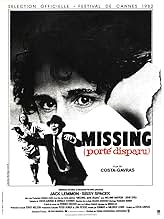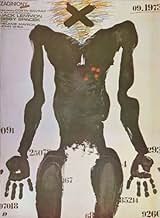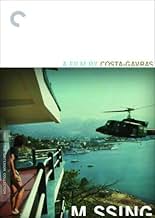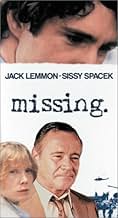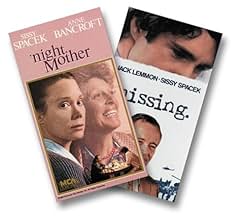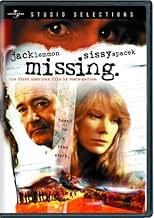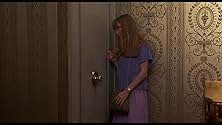Quando um idealista escritor americano desaparece durante o golpe de estado chileno em setembro de 1973, sua esposa e seu pai tentam encontrá-lo.Quando um idealista escritor americano desaparece durante o golpe de estado chileno em setembro de 1973, sua esposa e seu pai tentam encontrá-lo.Quando um idealista escritor americano desaparece durante o golpe de estado chileno em setembro de 1973, sua esposa e seu pai tentam encontrá-lo.
- Direção
- Roteiristas
- Artistas
- Ganhou 1 Oscar
- 12 vitórias e 23 indicações no total
- Paris
- (as Martin Lasalle)
Avaliações em destaque
The film itself remains a gripping eyeopener from first to last. Costa-Gravas is especially good at recreating the abject terror of fascist rule: where long hair is forbidden and women are forced back into skirts, where people are present one minute and gone the next, where a democratically elected government is present one minute and gone the next, and where a Henry Kissinger can do the behind-the-scenes dirty work and be honored for it (not in the movie, but true nevertheless). The acting is first-rate, and a tour-de-force for Lemmon in particular. Ditto, the often overlooked Charles Cioffi who puts the real chill in the confrontation scene. Two complaints: the arch symbolism of the riderless white horse conflicts with Costa-Gravas's documentary approach, and why, oh why, did they have to make Horman's son so cuddly. The audience gets the point without spooning on the sugar. Anyhow, this remains a fine piece of revelatory film-making and retains as much relevancy for today's audience as it did twenty years ago.
Jack Lemmon gives another standout performance (in a career that had many) as the uptight father that learns to accept his son only after his suspected death. The emotional evolution from devout christian/disapproving dad to grieving father with 'opened eyes' is engaging to watch. Sissy Spacek shows the strength that should have won her a second oscar 2001 for "In The Bedroom" as the wife who never stops looking for her husband. But the clear winner in this politcal thriller is the director Costa Gravas, who constantly keeps the politcal tension high, without upstaging the performances of the leads.
A great drama that deal with life/death and the bond between parents and their children.
This film won an Oscar for Best Screenplay. It was also nominated for Best Actor (Jack Lemmon), Best Actress (Sissy Spacek) and Best Picture. I am surprised that "Gandhi" won the Best Picture award that year--especially since the film was, in many ways, quite inaccurate historically (I am a history teacher--trust me on this one). "Missing" was a better film--as were "The Verdict", "Tootsie" and "ET" (in my semi-humble opinion). I wonder if perhaps the film's politics doomed it to lose--though considering Hollywood generally DOES run left, this may not be the case.
I am a reasonably conservative American, though I feel ashamed when I see films like "Missing" (as well as Costa-Garvas' other famous film, "Z"). While I am glad that the US had been traditionally anti-communist, this single-minded approach to international communism appears VERY misguided in hindsight. In too many cases, in order to combat this, the US government sponsored repressive and evil regimes--when they should have been pushing for self-determination and freedom. No matter how you try to excuse this, situations like the ones in "Missing" are simply inexcusable and the film should be seen by everyone--not just those on the left politically. Why? Because, the story in this case is TRUE--the situation involving the Pinochet regime in Chile was just plain evil--and should NOT be forgotten or ignored. History should be understood and lessons learned from them...or they'll be repeated. Well worth seeing and very well made overall.
Você sabia?
- CuriosidadesDuring the Pinochet dictatorship, which ran from 1973 to 1990, this picture was banned in Chile.
- Erros de gravaçãoWhen Ed Horman is at the State Department trying to get information about Charlie, there is the presidential portrait of Richard Nixon on the wall in the background and a more personal photo of him on Marine One on the credenza behind the desk. That photograph, with fingers in the V-peace sign, was taken upon his final departure from the White House in 1974 and could not have been on someone's desk in 1973.
- Citações
Consul Phil Putnam: Please try to understand. There are so many cases. They're all so important, and this isn't the only one we're working on.
Ed Horman: It's the only one I care about.
Consul Phil Putnam: You and a lot of other people. Listen, I've never seen so many cables from Washington. What kind of pull do you have up there anyway?
Ed Horman: I'm an American citizen.
- Trilhas sonorasMy Ding a Ling
(1952)
Written by Chuck Berry (uncredited)
Performed by Chuck Berry
Courtesy of All Platinum Records, Inc.
Principais escolhas
Detalhes
- Data de lançamento
- Países de origem
- Idiomas
- Também conhecido como
- Desaparecido
- Locações de filme
- Acapulco, Guerrero, México(as Vina del Mar)
- Empresas de produção
- Consulte mais créditos da empresa na IMDbPro
Bilheteria
- Orçamento
- US$ 9.500.000 (estimativa)
- Faturamento bruto nos EUA e Canadá
- US$ 14.000.000
- Faturamento bruto mundial
- US$ 14.000.000
- Tempo de duração2 horas 2 minutos
- Cor
- Proporção
- 1.85 : 1
Contribua para esta página



